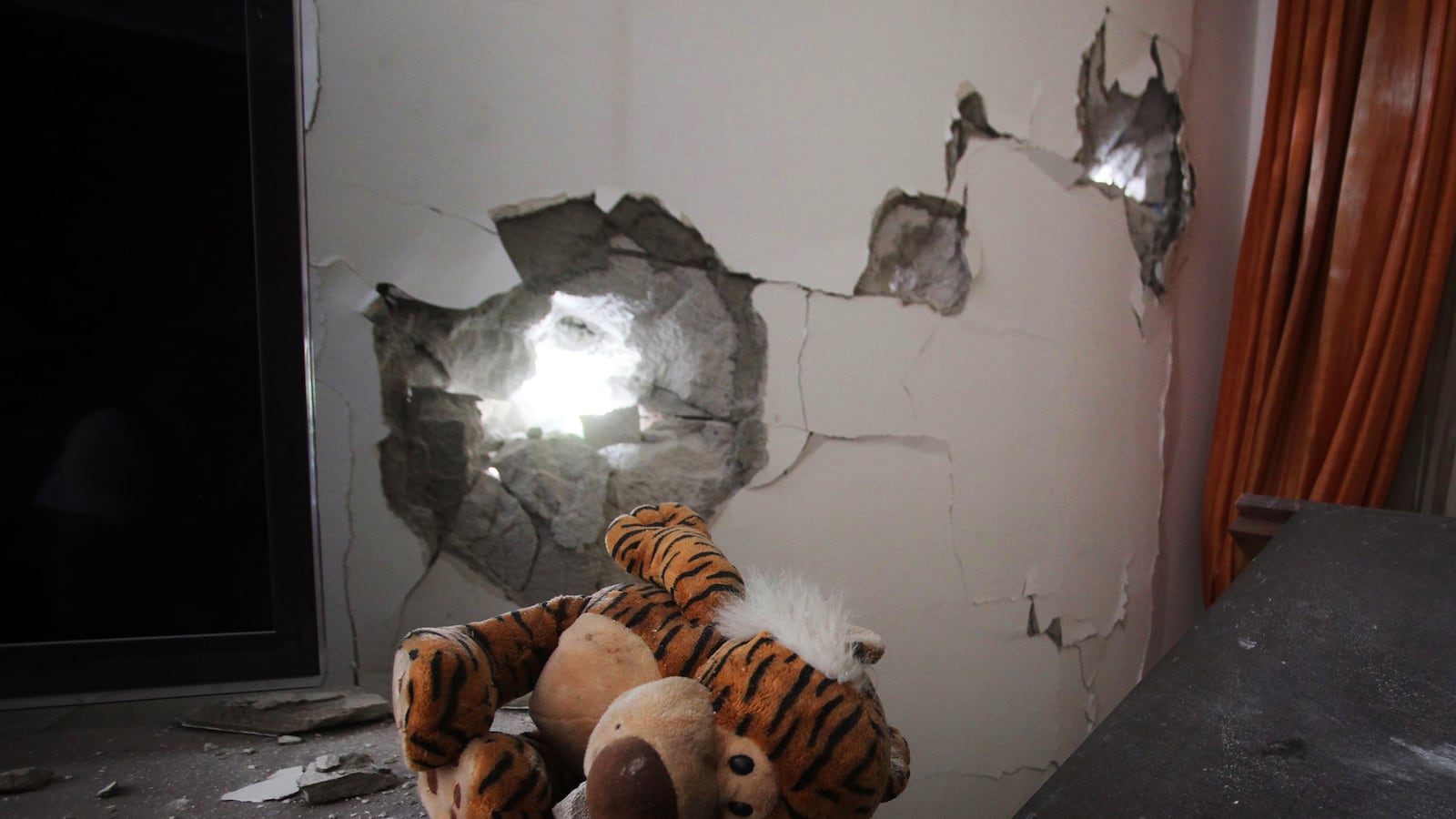For the last week, Israela Natan, normally a down-to-earth mother of three, has been so glued to her cellphone, you’d think it was her only source of oxygen. And in some ways, it might as well be.

“I live and breathe it,” she said from her house in Ashdod, a city about 20 miles north of Gaza. “I’m a total addict, I won’t lie.”
Natan, 38, is a Weight Watchers instructor who usually spends her days crisscrossing southern Israel, but she hasn’t been to work since the rockets first came raining down on her neighborhood. Seeking much-needed peace of mind, she downloaded Red Alert, an app that goes off every time a rocket is fired into Israel. It’s quickly become one of the most popular applications in the country, with 780,000 downloads, most of them in the last week alone.
“It just gives me that extra bit of information that makes me feel like I’m still in control,” said Natan.

As Operation Protective Edge enters its eighth day, more than 900 rockets have been fired from Gaza into Israeli territory, hitting Israeli cities and sending its citizens running to bomb shelters. On a good day, it can happen four to five times. On bad days, it’s hard to keep count.
People here have adapted to a way of life that seems almost incomprehensible to those living in other parts of the world. They’ve swapped their leather work shoes for sneakers; those sharing shelters have learned to sleep in their clothes. Showers, which have always been rather short in this desert land, have become even shorter—not so much to conserve water but to avoid having to encounter neighbors while wrapped in a towel. Worry has become as automatic a reflex as breathing in your sleep.
So Red Alert came as a relief to Chen Shitrit, whose mother died of a rocket attack in 2008 when she was driving home from a gym class and the siren sounded. Since she was on a major highway, there was nowhere to hide. The rocket landed nearby, and she died shortly afterward in the hospital. “I downloaded the app last week, as soon as the attacks began,” said Shitrit. “I’m not taking any chances.”
During 2012’s Operation Pillar of Defense, as Israel was being bombarded with hundreds of rockets every day, software developer Ari Sprung and his partner, Kobi Snir, worried that some in the affected areas wouldn’t be able to hear the newly established “Red Color” emergency sirens, created to warn residents of incoming rocket attacks. As a backup, they developed Red Alert, an app that sounds a warning siren on the user’s cellphone at the same time the real sirens go off.
“People were having a hard time,” said Sprung. “They couldn’t really sleep because they were too afraid they were going to miss the sirens. The app allows them to go to bed knowing the phone will wake them up in case of an emergency.”
Red Alert—which combines up-to-the-minute, real-time information from the Israel Defense Forces and Homefront Command, the Israeli version of Homeland Security—gives people a 15- to 90-second warning, depending on their proximity to Gaza. And it has quickly become a lifesaver.
“It gives me tranquility,” said Batya Katzir, another Ashdod resident. “I get an idea of what’s going on.” Although the sirens are extremely reliable, they only go off when a rocket is about to hit the user’s exact location. The app, on the other hand, beeps every time a rocket is launched at any Israeli city. “If I see that all the other towns nearby have been shot at all day, I know they’re getting busy and at some point will be shooting at us, as well. On those days, I usually try to stay home or, if I must go out, I only drive through areas I know have buildings I can easily run into,” she said.
The app also is proving to be a powerful alternative news source for people around the world who are growing tired of traditional media outlets such as CNN or Fox News and want to get a taste of life in Israel under rocket fire.
“When you get a ping every other minute, it really allows you to get a sense of what it’s like during this incredibly stressful time,” said Sprung.
But while the app has been a godsend to some, it’s been a source of stress and even panic to others.
“Every time a rocket was launched, my phone went haywire,” said Dor Eldar, a 22-year-old dance instructor from Tel Aviv. “I finally had to get rid of it. It was driving me nuts.”
Yifat, a computer technician who asked that her last name not be published, said she also deleted the app, just 24 hours after she downloaded it. “It really stressed me out.” She said her daughter still uses it, as do most of her friends. “It paralyzed me with fear,” she added. “It wouldn’t stop beeping, and quite frankly I didn’t need to be reminded of how things were every minute of every day.” At that point our phone interview about running to shelters was cut short when my own Red Alert sounded off, warning of a rocket about to hit Tel Aviv. (The rocket was successfully intercepted by the Iron Dome, Israel’s now legendary air defense system.)
And then there are those who live so close to Gaza that the app can’t help them. “Those who’ve downloaded it here only use it to get a sense of what’s going on,” said Eran Avni, a videographer and editor from Be’eri, a kibbutz that sits right on the Israel-Gaza border. Avni is part of a small number of Israelis who are within the 15-second warning zone. “All it does is create unneeded hysteria.”
Back in 2008, during Operation Cast Lead, Avni nearly lost his then-12-year-old daughter, Yarden, to a rocket attack. Yarden was on her way home from school when a Qassam hit their kibbutz, landing less than 100 feet away. A fragment penetrated her shoulder, missing a major artery by an inch. “I get why some people like using it, but it wasn’t for me,” he said.
Despite the detractors, Red Alert has become so ubiquitous that even the government is aware of it. “It’s a helpful and innovative app,” said Jonathan Moser, spokesman for the Israeli Ministry of Defense, “but it does not, and should not, replace existing Homefront Command and army tools and procedures.”
Perhaps the Israeli government just wants a piece of the app’s meteoric success—Homeland Command is coming out with its own version later this year, as is another Israeli startup company. Both could give Red Alert a run for its money.
The new government app not only would alert people of incoming rockets but also would give them information and instructions on what to do in case of emergency. Caught in one of the danger zones? One press of a button and the app will bring up driving directions to a safer location. “This is just the beginning,” said Saab Anwar, former IDF colonel and CEO of Licompass, a disaster management company. Anwar’s firm won the exclusive rights to a new government-sanctioned app called Raz106, which he says will be more accurate and more secure than Red Alert.
Asked whether such apps could possibly tip off the enemy with up-to-the-minute information on where the rockets are landing, allowing them to better their aim, Anwar said no. “It’s true that anyone, including Hamas, could download it, but the information is limited,” he said. “We make sure never to give out exact locations. It’s nothing they can’t get by watching TV or looking at Facebook.”
And if you think these new apps are cool, they’re just the tip of the iceberg, according to the Israeli government. “In the next three to four years, you’re going to see an incredible change in this area,” said Levi Itach, head of the Israeli Early Warning Branch. Even though Iron Dome has been effective at intercepting incoming rockets, he said, Hamas has managed to score a direct hit on Israel’s economy. In the future, instead of sending an entire city into a shelter, Israel would be able to reduce the disrupted areas to certain blocks, he said.
He predicted that in the very near future, automated systems could take over, for example, someone’s car radio, pop out whatever CD they’ve been listening to, and deliver a warning only to those who happen to find themselves driving into a targeted danger zone.
“We want to be able to minimize Hamas’ stronghold on major areas,” he said.






